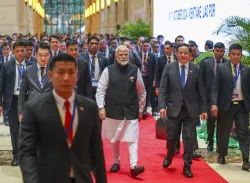PM Modi's stern message at ASEAN Summit, says terrorism serious challenge to global peace
At the ASEAN Summit in Vientiane, PM Modi stressed the importance of dialogue and diplomacy, asserting that these should take precedence in resolving disputes.

Vientiane: Prime Minister Narendra Modi, while addressing the ASEAN Summit in Vientiane on Thursday, emphasised the urgent need for peace and stability in regions experiencing conflict, particularly in Eurasia and West Asia. "The conflicts going on in different parts of the world are having the most negative impact on the countries of the Global South," highlighting the disproportionate effects of global unrest on developing nations.
The Prime Minister reiterated his earlier stance on war when he said "This is not an era of war". "I come from the land of Buddha, and I have repeatedly said that this is not the era of war. Solutions to problems cannot come from the battlefield," he added.
The Prime Minister underscored that countries must respect sovereignty, territorial integrity and international laws. He said India's eagerness to contribute in every possible way to resolve the ongoing conflicts.
"It is necessary to respect sovereignty, territorial integrity and international laws. Keeping a humanitarian approach, dialogue and diplomacy will have to be given priority. Fulfilling the responsibility of Vishwabhadhu, India will continue to contribute in every possible way in this direction," he noted.
He noted that the most negatively affected countries, due to ongoing conflicts in various parts of the world, are those from the Global South. There is a collective desire for the restoration of peace and stability in regions such as Eurasia and West Asia as soon as possible, he said.
“I come from the land of Buddha, and I have repeatedly stated that this is not the era of war. Solutions to problems cannot come from the battlefield,” PM Modi said. It is essential to respect sovereignty, territorial integrity, and international laws, he said, adding that with a humanitarian perspective, “we must place a strong emphasis on dialogue and diplomacy”.
In fulfilling its responsibilities as a ‘Vishwabandhu’, India will continue to make every effort to contribute in this direction, PM Modi said. His remarks came amidst conflicts between Ukraine and Russia in Eurasia and the Israel-Hamas war in West Asia.
Asserting that terrorism also poses a serious challenge to global peace and security, PM Modi said that to combat it, forces that believe in humanity must come together and work in tandem. “And, we must strengthen mutual cooperation in the areas of cyber, maritime, and space,” PM Modi added. At the start of his address, the prime minister expressed his deep condolences to those affected by "Typhoon Yagi”, a destructive tropical cyclone which impacted Southeast Asia and South China in September this year.
“During this challenging time, we have provided humanitarian assistance through Operation Sadbhav,” he said.
PM Modi also said India has consistently supported the unity and centrality of the Association of Southeast Asian Nations (ASEAN). ASEAN is also pivotal to India's Indo-Pacific vision and Quad cooperation, he said.
There are important similarities between India’s "Indo-Pacific Oceans Initiative" and the "ASEAN Outlook on Indo-Pacific”, the prime minister pointed out. “We endorse ASEAN's approach to the situation in Myanmar and support the Five-Point Consensus. Furthermore, we believe it is crucial to sustain humanitarian assistance and implement suitable measures for the restoration of democracy,” PM Modi said. “We believe that Myanmar should be engaged rather than isolated in this process,” he said.
(With inputs from agency)
